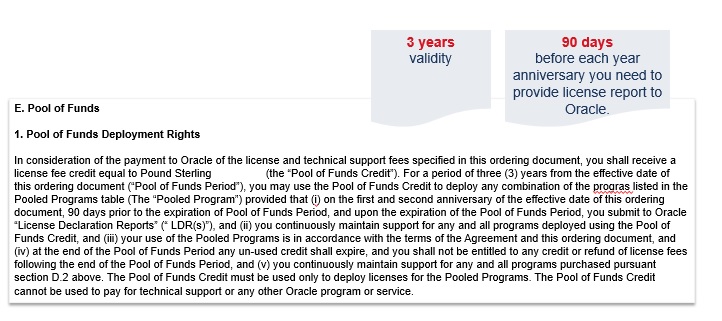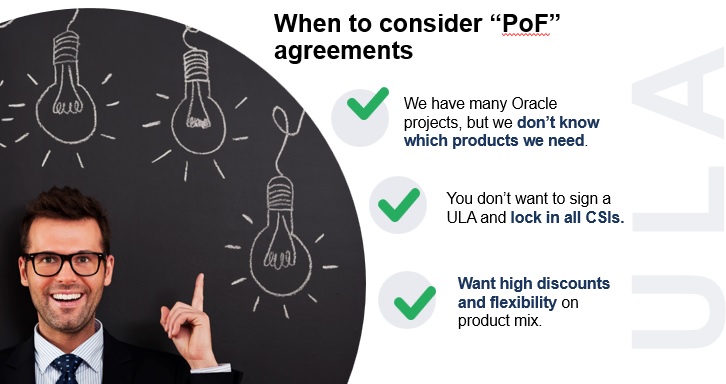
Oracle Pool of Funds – Overview
What is Oracle Pool of funds license agreement ?
The Oracle Pool of Funds License Agreement is a license agreement between Oracle Corporation and a customer that allows the customer to purchase a set amount of Oracle software licenses, which are then placed in a “pool” that can be used by the customer to deploy Oracle software on multiple servers or devices. This type of license agreement can provide flexibility and cost savings for organizations that have fluctuating or unpredictable software usage needs, as it allows them to purchase licenses upfront and then use them as needed, rather than purchasing licenses on a per-server or per-device basis.
Under the terms of the Oracle Pool of Funds License Agreement, the customer must specify the total number of licenses to be placed in the pool, and must pay an annual maintenance fee for each license in the pool. The customer can then use these licenses to deploy Oracle software on any number of servers or devices, as long as the total number of licenses in use at any given time does not exceed the number of licenses in the pool. The customer may also be required to provide Oracle with periodic reports on the number of licenses in use and the servers or devices on which the software is deployed.
It is important for customers to carefully review the terms of the Oracle Pool of Funds License Agreement and to understand their obligations under the agreement, as well as the terms of use for Oracle software. Customers should also ensure that they have the necessary resources and systems in place to track and manage their use of Oracle software licenses under this type of agreement.
What are the benefits of Pool of Funds?

- Flexibility: By purchasing a set number of licenses upfront and placing them in a pool, organizations can have the flexibility to deploy Oracle software on multiple servers or devices as needed, without having to purchase additional licenses each time. This can be particularly useful for organizations with fluctuating or unpredictable software usage needs.
- Cost savings: The Oracle Pool of Funds License Agreement can provide cost savings compared to purchasing licenses on a per-server or per-device basis, particularly for organizations that do not need to use Oracle software on a large number of servers or devices at all times.
- Simplified license management: The pool of licenses can be easier to manage than tracking and managing individual licenses for each server or device.
- Easy scalability: The pool of licenses can be easily scaled up or down as needed, allowing organizations to quickly and easily add or remove licenses as their software usage needs change.
It is important to note that the specific benefits of using a Oracle Pool of Funds License Agreement will depend on the specific needs and circumstances of the organization. Customers should carefully evaluate their software usage needs and consider whether this type of license agreement is the best fit for their organization. Most organizations choose Oracle ULA over a PoF.
What are the drawbacks with PoF?
There are a few potential drawbacks to using a Oracle Pool of Funds License Agreement:
- Upfront costs: One potential drawback is that the customer must pay for the entire pool of licenses upfront, rather than on a per-server or per-device basis. This can be a significant financial commitment, particularly for organizations that do not have a clear idea of their future software usage needs.
- Maintenance fees: The customer must also pay an annual maintenance fee for each license in the pool, which can add to the overall cost of using the licenses.
- Reporting requirements: The customer may be required to provide Oracle with periodic reports on the number of licenses in use and the servers or devices on which the software is deployed. This can be time-consuming and may require additional resources to track and report on this information.
- Limited flexibility: The pool of licenses can only be used to deploy Oracle software on servers or devices, and cannot be used for other purposes such as training or development.
It is important for customers to carefully evaluate the potential drawbacks of using a Oracle Pool of Funds License Agreement, and to consider whether this type of license agreement is the best fit for their organization. Customers should also be sure to carefully review the terms of the agreement and understand their obligations under the agreement.
Reporting
Under the terms of a Oracle Pool of Funds License Agreement, the customer may be required to provide Oracle with periodic reports on the number of licenses in use and the servers or devices on which the software is deployed. The specific reporting requirements will depend on the terms of the agreement, and customers should carefully review these requirements and ensure that they are in compliance.
To report to Oracle, the customer may be required to use a specific reporting tool or process, which may be provided by Oracle. The customer may also be required to provide specific information about the use of the licenses, such as the number of licenses in use, the servers or devices on which the software is deployed, and the specific Oracle products and versions being used.
If you need help with an Oracle Pool of Funds agreement – we can help you manage and report licenses to Oracle. Contact us today.